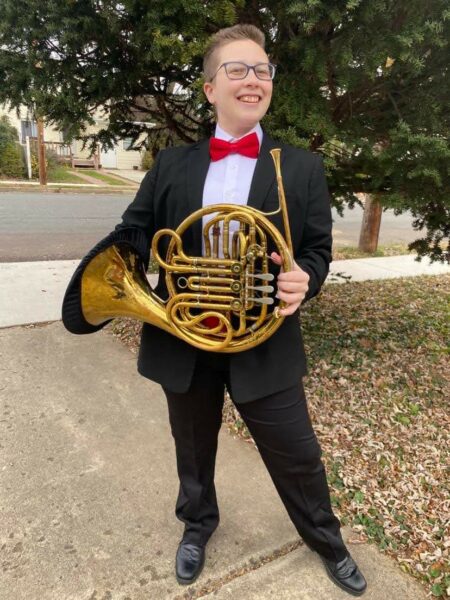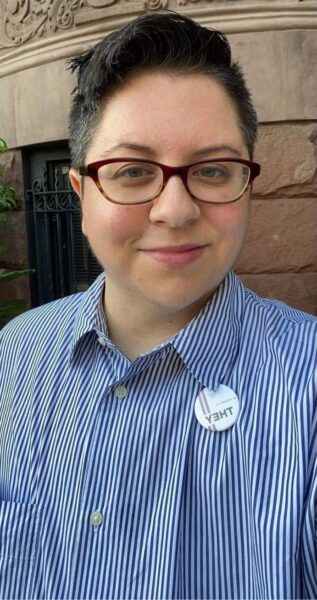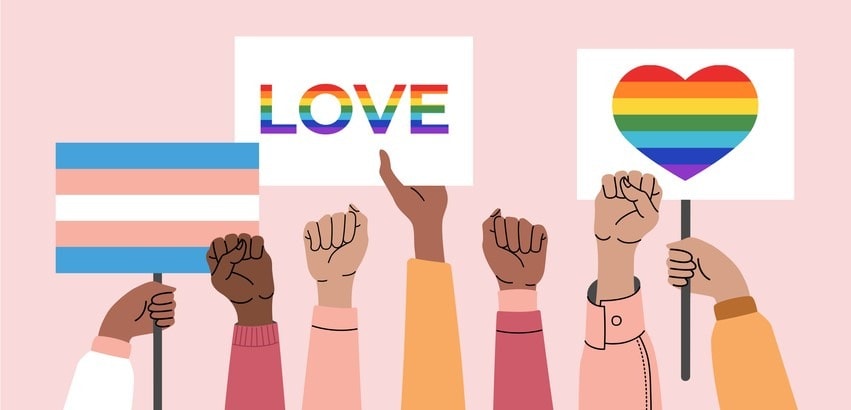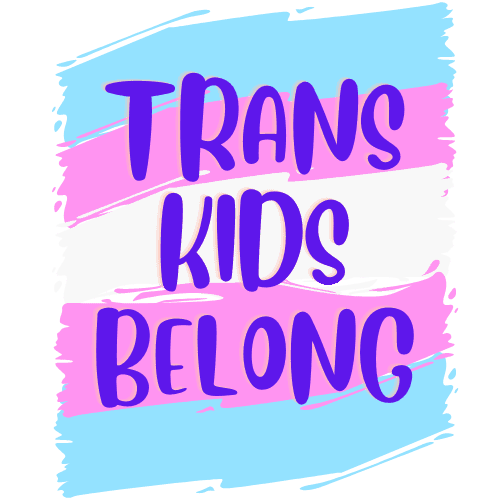/ News Posts / Transgender Inclusivity in Schools: Easy, Necessary, and Life-Saving
Transgender Inclusivity in Schools
Easy, Necessary, and Life-Saving
By NAfME Members Ær Queen and Nicholas Prosini
Presented Just Gender: Pathways to Inclusivity in Music Classes at the “NAfME is ME!” 2022 NAfME National Conference in National Harbor, Maryland.
As a group, music teachers are incredibly thoughtful and caring people. We always want to do the best for our students, and we want our students to know they belong in our spaces. We see them over many school years and often build relationships that last long after graduation. The students who feel that sense of belonging are the students who continue interacting with music long after they’ve left our rooms.
If someone told you that 7-14% of your students belonged to a particular culture, most music teachers I have met would learn as much as they could about that group: their songs, traditions, and anything else that we can find so that those students feel included. When you find out that more than half of those students strongly considered suicide, and almost 1 in 5 of those students had made a suicide attempt in the past year, most music teachers would do everything in their power to help, right?
This is not a hypothetical scenario. This is the reality for our transgender and gender-expansive students; and in the education profession we can do so much more to help keep our children alive and even give them the space to thrive.
How Can I Include Transgender and Nonbinary Students in My Classroom?
- Know upfront that you teach transgender and gender-expansive students. We (transgender people) exist everywhere and come from every country, culture, and walk of life. Children as young as three have the ability to know that their gender differs from their sex assigned at birth, which means that this is relevant in every single classroom, from the Pre-K to university level.
- Use inclusive language. We’ve all used “ladies and gentlemen” or “boys and girls” to address our students, and it’s time to step away from that. Let’s instead say, “musicians,” “composers,” “dancers,” or even something fun that your students come up with themselves! Not all students who appear to be a particular gender are actually that gender, and binary language can harm students who have “come out” as well as students who aren’t “out” yet.
- Believe students when they tell you about themselves. Music teachers are so lucky: We get to experience students at their highest and lowest moments, and with that experience, our students sometimes trust us differently than they do their classroom teachers. When a student “comes out” to you, believe them, every time. Learning the language for your identity can be a long—sometimes lifelong—process, so when students come out more than once, it does not mean that the first time was just a phase (or the second, or the third …). More often than not, they are just becoming more familiar with who they are. Believing them is so important.
What about Parents?
Parent involvement in students’ educational lives is a key part of what makes a system strong, but when it comes to our transgender students, it is imperative that we tread carefully and follow the lead of the young people we are tasked with keeping safe every day.
When a student comes out to you, one of the first things we should ascertain is whether their parents know AND if they want their parents to find out yet. We need this information because the only person who should have a say in when and whether they come out is the person who is coming out. Coming out to anyone can be an amazing experience, when it’s on our own terms and our students deserve to have those moments and come to them in their own time.
As much as we would like to believe that parents have their children’s best intentions at heart, becoming forcibly unhoused—or worse—at the behest of parental figures is a scary and real possibility for many transgender young people. Fewer than ⅓ of young transgender and nonbinary people feel safe and affirmed at home, and in 2017 as many as 40% of the young unhoused population were a part of the LGBTQIA+ community. Compare that to the fact that only 7-14% of total young people self-identify as transgender, and we can see that this is a serious problem.
When you keep a student’s transgender status private, you are not removing parents from the picture: We are fulfilling our responsibility as teachers to keep our students safe, and sometimes even alive.
Does Any of This Make a Difference?
The short answer is, absolutely and without a doubt: yes.
Multiple studies have shown that as few as one affirming adult in a transgender young person’s life does make a difference in their levels of depression and suicidality. In their most recent National Survey on LGBTQ+ Youth Mental Health, the Trevor Project reported that, “LGBTQ youth who found their school to be LGBTQ affirming reported lower rates of attempting suicide,” and, “Although our data continue to show high rates of mental health and suicide risk among LGBTQ young people, it is crucial to note that these rates vary widely based on the way LGBTQ youth are treated.”
We can and should do more to support our transgender young people. Believing and affirming their truth is a small step, but one we all can take to help keep more young people alive.
Website: bit.ly/genderintersections
About the authors:
 Ær Queen (they/them) is a trans non-binary and autistic General Music teacher at Braddock Elementary School in Annandale, Virginia. This is their 8th year teaching General Music, and they are a proud alum of Shenandoah Conservatory where they earned their Bachelor of Music in Music Education.
Ær Queen (they/them) is a trans non-binary and autistic General Music teacher at Braddock Elementary School in Annandale, Virginia. This is their 8th year teaching General Music, and they are a proud alum of Shenandoah Conservatory where they earned their Bachelor of Music in Music Education.
Ær is passionate about helping educators view the importance of gender inclusivity in schools through the first-person lens of a practicing transgender teacher, and they have presented at numerous conferences throughout the United States including 11 state MEAs, the VEA Summit for Racial and Social Justice, and the National Alliance for Partnerships in Equity—National Summit for Educational Equity.
In their classroom, they do everything they can to make sure that their students know they are loved, cared for, and included from the moment they enter the classroom. Ær works on being intersectional and anti-racist in their teaching practice and was recognized as a quarterfinalist for the 2022 and 2023 Grammy Music Educator AwardsTM.
 Nicholas Prosini (they/them) is a transgender nonbinary 15th year music teacher at Amber Charter School in NYC. Mx. Prosini teaches K–5 general music, choir, and beginner band. They hold a Bachelor of Music from Mason Gross School of the Arts at Rutgers University, and a Masters of the Arts in Music Education from Montclair State University.
Nicholas Prosini (they/them) is a transgender nonbinary 15th year music teacher at Amber Charter School in NYC. Mx. Prosini teaches K–5 general music, choir, and beginner band. They hold a Bachelor of Music from Mason Gross School of the Arts at Rutgers University, and a Masters of the Arts in Music Education from Montclair State University.
When the COVID pandemic began, Mx. Prosini reimagined their entire music program to exist digitally. Mx. Prosini has a passion for technology and has further developed their skills using Logic Pro X, Final Cut Pro, and Google Chrome Lab. Mx. Prosini’s students have learned to use a step sequencer and record videos of themselves singing soloistically.
Mx. Prosini is an advocate of trans and gender expansive visibility in K–12 schools for both children and adults. They also organize online support spaces for trans educators around the United States. Mx. Prosini is earning a masters of science in educational leadership at Hunter College.
Did this blog spur new ideas for your music program? Share them on Amplify! Interested in reprinting this article? Please review the reprint guidelines.
The National Association for Music Education (NAfME) provides a number of forums for the sharing of information and opinion, including blogs and postings on our website, articles and columns in our magazines and journals, and postings to our Amplify member portal. Unless specifically noted, the views expressed in these media do not necessarily represent the policy or views of the Association, its officers, or its employees.
September 6, 2022. © National Association for Music Education (NAfME.org)
Published Date
September 6, 2022
Category
- Diversity, Equity, Inclusion, and Access (DEIA)
- Gender
- Sexuality
Copyright
September 6, 2022. © National Association for Music Education (NAfME.org)






